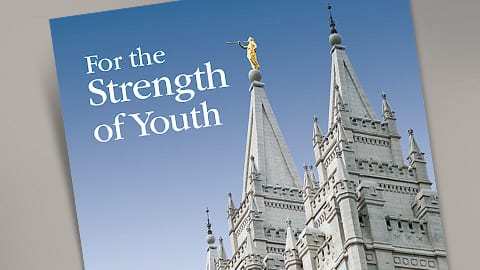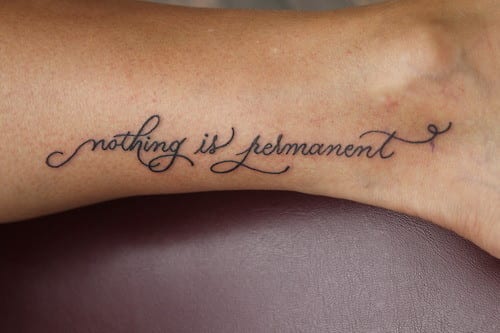Ask any Mormon why he or she doesn’t have a tattoo and more than likely you will get the quick reaction from 1 Corinthians 6:19 that our bodies are a temple. But in my experience in counseling with and teaching young people, this phrase may need further explanation to help them grasp the spirit, and not only the letter, of this law. In the Mormonism of their world, with the infusion of converts and people who have left and rejoined the church, seeing tattoos in church is no longer a shocking thing like it once was. More and more of our young people seem to be toying with the idea and wondering what is so wrong about getting a tattoo? After all, I’ve seen many a lower back tattoo that looks pretty similar to the sun on the outside of the Nauvoo temple. On our LDS temples we have words, symbols, celestial bodies, nature elements, and artistry all pointing to significant messages and themes for that temple. I have often received the question from a well-intentioned youth about why it is so different to adorn the body with the same kind of artistry? Why can we adorn our temples, inside and out, with art and décor, but not our bodies? Perhaps like all answers in the church, the truth comes in layers and “our bodies are temples” is only layer #1. The following are the reasons I have personally given to help the youth of today understand why the rule exists.
 Getting a tattoo has been discouraged even from before President Hinckley’s talk in 2000, but once the damage is done, does not limit one’s access to the temple, the ability to go on most missions, or even limit one’s career serving in the church, as made visually evident by Al Fox the famous “Tattooed Mormon”. Tattoos are mainstream now, like a woman’s pair of earrings. This leads some, particularly the youth, to wonder if earrings are allowed because it is “normal”, perhaps the same will come of tattoos. One can hardly get through a question and answer session with a youth group without someone asking why tattoos are even wrong at all. Their generation isn’t one of hippies getting tattoos with a side of LSD and anti-establishment. Their generation is one where tattoos can be artistic, meaningful, and even spiritual, and the older generation’s warnings seem to no longer be relatable. This requires us as leaders to better explain the guidelines regarding the body in the For the Strength of the Youth Pamphlet in a way that makes sense for their generation.
Getting a tattoo has been discouraged even from before President Hinckley’s talk in 2000, but once the damage is done, does not limit one’s access to the temple, the ability to go on most missions, or even limit one’s career serving in the church, as made visually evident by Al Fox the famous “Tattooed Mormon”. Tattoos are mainstream now, like a woman’s pair of earrings. This leads some, particularly the youth, to wonder if earrings are allowed because it is “normal”, perhaps the same will come of tattoos. One can hardly get through a question and answer session with a youth group without someone asking why tattoos are even wrong at all. Their generation isn’t one of hippies getting tattoos with a side of LSD and anti-establishment. Their generation is one where tattoos can be artistic, meaningful, and even spiritual, and the older generation’s warnings seem to no longer be relatable. This requires us as leaders to better explain the guidelines regarding the body in the For the Strength of the Youth Pamphlet in a way that makes sense for their generation.

Recently, Peggy Fletcher Stack of the Salt Lake Tribune brought up the tattoo question with the unusual situation that Polynesian Culture Center workers find themselves in. They go to work with their tribal tattoos on display and draw temporary tattoos on Mormon tourists only to have to completely cover them up the next day in class at BYU-Hawaii. Yet both institutions are owned by the church. There are a handful of other examples of where the line gets muddled. My devout LDS grandmother tattooed her makeup on so she can be (horrifyingly) ready to go with purple eye shadow any time day or night. Utah Mormons, statistically, are also not strangers to nose jobs or breast enhancements. There are children and adults who get tattoos of relevant medical information to save their lives. These ethical scenarios help us further understand what it means to abstain from tattoos with more depth and thought. So what could some of the reasons be that we are counseled to not tattoo our bodies?
Reason #1 – We Change
One reason not to get tattoos is because of the simple fact of who we are today is not going to be who we are tomorrow. So although NSYNC was the most important thing to me in the 8th grade, it would be unwise to get a tattoo of Justin Timberlake’s face on my bicep. On temples the message is always at the highest level. Messages about God, progression, eternal realities, and glory lift the soul and enlighten the mind. Most tattoos cannot claim such. Tattoos when we look back, for the most part, reminds us of a certain time in our life. Like we are a passport with a bunch of stamps on it. President Hinckley talked about this when he promised that one day we would regret getting a tattoo at some point later on[1], when we had changed or grown. The most unique doctrine in the church is that the church as a whole changes, its alive, and that we individually change too. Tattoos then would limit our ability to feel like we can move in a whole new direction. As Jack London says, “Show me a man with a tattoo and I’ll show you a man with an interesting past.” And though there’s nothing wrong with an interesting past, the point of the gospel is that the person we were yesterday doesn’t have to be the person we are tomorrow. In the church we should also never judge someone who comes into our congregation with some questionable stamps on their passport. We all have the markings of our past upon us, some are just more visible than others, and we all come to church for the opportunity to look forward and not backwards.
Reason #2 – Societal Precedent
Often in the gospel we find rules applying to some culture at some time that is not applied to all cultures. There’s nothing wrong with that, we have scriptures from thousands of years before the birth of Christ and if the church is truly a living church then hopefully a lot has changed since then in order for God to be real to us today. Even within one time frame and culture sometimes the rules change. To the Anti-Nephi-Lehis the right thing to do was to bury their weapons, and for the next generation the right thing to do was to take them up again. Mormonism has always had the stance that rules, practices, and procedures change and by studying the scriptures as a whole one can come to an understanding of the “whys” and not just the “hows”. So in some cultures, tattoos are a part of community rituals and family culture where the paternal and maternal lines are printed on the children as a means of heritage and like a living family tree. Do you think God condemns such as sinners before the law? I highly doubt it.
 But what about American culture? In American culture what are tattoos about? Attention. Vanity. And in that vein, tattoos in America aren’t given the cultural value that is given to our tattooed brothers and sisters in the Polynesian Islands. The cultural value and artistry is beautiful in context of their history and something that is praised at the PCC. But even with such a beautiful history recorded on skin, modern day members of the Polynesian Islands are still softly encouraged to let the practice go, though some Mormons leaders choose to continue the practice and are not relieved from leadership positions for doing so. In an address to the youth Morgan Sa Mataalii said: “When I was a young man, my dad talked to me about the tribal band tattoos that are common… . Dad said, ‘Don’t participate in any of that. You’re a child of God before you’re Samoan, before you’re a big, tough, guy from the islands.’ That is something I have always remembered[2].” Tattoos can be valued as a part of a cultural tradition while still moving forward and recognizing that not all traditions are relevant today. There are more ways to tell stories, link families, and record genealogies today than there were in the past. So under this reason, the explanation for why tattoos are bad is not because it is always bad in every situation, but because in our culture it is about drawing vain attention, like adding blaring music to outside of the temple to get people to look. This kind of attention distracts from the essence of who we are instead of enhancing it, and the cultural necessities for tattoos are no longer as relevant as they once were.
But what about American culture? In American culture what are tattoos about? Attention. Vanity. And in that vein, tattoos in America aren’t given the cultural value that is given to our tattooed brothers and sisters in the Polynesian Islands. The cultural value and artistry is beautiful in context of their history and something that is praised at the PCC. But even with such a beautiful history recorded on skin, modern day members of the Polynesian Islands are still softly encouraged to let the practice go, though some Mormons leaders choose to continue the practice and are not relieved from leadership positions for doing so. In an address to the youth Morgan Sa Mataalii said: “When I was a young man, my dad talked to me about the tribal band tattoos that are common… . Dad said, ‘Don’t participate in any of that. You’re a child of God before you’re Samoan, before you’re a big, tough, guy from the islands.’ That is something I have always remembered[2].” Tattoos can be valued as a part of a cultural tradition while still moving forward and recognizing that not all traditions are relevant today. There are more ways to tell stories, link families, and record genealogies today than there were in the past. So under this reason, the explanation for why tattoos are bad is not because it is always bad in every situation, but because in our culture it is about drawing vain attention, like adding blaring music to outside of the temple to get people to look. This kind of attention distracts from the essence of who we are instead of enhancing it, and the cultural necessities for tattoos are no longer as relevant as they once were.
Reason #3 – It’s What’s on the Inside
Another solid reason for why tattoos will probably always be discouraged is because it’s the heart that really counts. That’s why we are here. So as much as it is nice to have a tattoo that says “family”, that family would probably want that time and money more than the tattoo. Having a cross tattoo doesn’t necessarily mean anything to Jesus at the judgment bar. As uplifting as the message could be, it will never be more important than the inner commitment to it. We want so bad as human beings to find meaning in our lives, and when we find it, we want other people to know about it. But the message in the New Testament over and over is that God honors those who quietly give, privately pray, and serve without any need of honor or reward. What we do in secret will be rewarded in public as it says in Matthew 6. So even if tattoos become even more mainstream than they are today, ultimately, they will never matter more than the journey going on inside. And because the church is in the business of souls, the message will always be let’s focus on the inner spiritual path. God doesn’t write his law upon our bodies, but he says in Jeremiah 33, “I will put my law in their inward parts, and write it in their hearts; and will be their God.”
Reason #4 – Body and Spirit
Mormonism is somewhat unique in religious philosophy in that they believe that both body and spirit are made of matter, and that both continue after death. This belief is at the base of many Mormon practices, and why we have so many rules dealing with our bodies. In some philosophies it is the spirit that is lasting, and the body is something to be subdued. In other philosophies, it is the brain that consists our sense of self and nothing more. But in Mormonism our relationship with our bodies continue, and what is the point of getting a nice shiny new body in the afterlife if we haven’t figured out how to deal with it? And in that afterlife, will the tattoos we get in this life continue? Probably not. So in this life we practice this relationship we have with our bodies as we constantly nourish body and spirit. We exercise, eat healthy, pray, meditate, and our bodies become part of our very essence. If that is the case, in the eternal perspective, tattoos become quite meaningless in this eternal relationship we have with our bodies.
Conclusion
Often in Mormonism we get caught up with the list of what is right and what is wrong. But that line of questioning only gets us so far. The more important question is why is it right and why is it wrong. Only in that way can one both understand and transcend the law, and its certainly the only way to read the scriptures with any level of consistency. The rule isn’t to never get a tattoo or suffer eternal hellfire. The real question to ask ourselves is why? Why do I want this tattoo? How would this tattoo enhance my beliefs? How would this tattoo affect my relationship with my body? How would this tattoo be a blessing to me in my old age? How would this tattoo affect how my soul? Through these deeper questions one can navigate more effectively when a tattoo is or is not appropriate rather than view this issue as entirely black and white. There are no grounds for discrimination against those who have tattoos; we don’t know the reasons why they did so or their story. But we should be introspective and serious about such a permanent decision for ourselves, and whether our reasoning truly holds up or if we just really, really like Justin Timberlake.
[1] Gordon B. Hinckley. “Your Greatest Challenge, Mother”. Ensign, October 2000.
[2] Morgan Sa Mataalii. “Small and Simple Things”. Liahona, June 2011.
The post Tattoos Today appeared first on FairMormon.
Continue reading at the original source →








